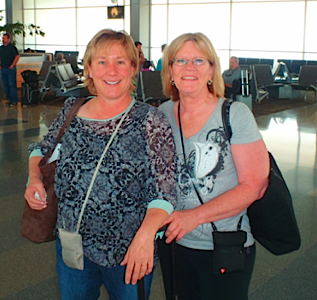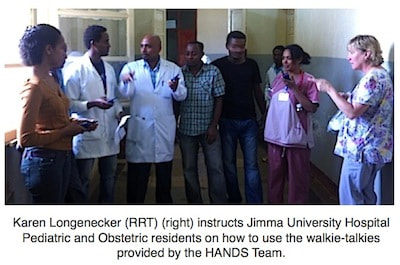 Karen Longenecker, RRT (L) and Pam Null, RN(R) In my two week experience I can hope that the best possible care will be provided by a compassionate, caring staff, but they are limited to the facility, equipment and supplies at their disposal: water drawn from a 55 gallon drum with an old coffee pot. There is no point in training mothers in procedures, such as bottle-feeding, since compliance will be out of the question. Sterilization is so far off that one does not know where to begin, but just remember that virtually everything is potentially reusable. At least there is a better chance that in a hospital the equipment will be cleaned properly. If we can train one unit on neonatal care, it would be like a pebble dropped in a pond where the ripple effect would grow and spread throughout the country. The point is not to be critical, rather to hopefully open your eyes. There is a huge need for those who feel compelled to do something. Simply, I see that I cannot change the world, but Karen (Longenecker) and I have found that there are a few small things that we can do to help a single facility. We know that that would make an enormous impact on improving the chances that would directly support the neonatal caregivers at Jimma University Hospital, and those whom they serve. “We can change the world one thought at a time, one baby at a time, one family at a time, one community at a time, one city, one state and one country at a time. And the time is NOW!” – Pamela Null, R.N. Our recent trip to update the nursery at Jimma University Hospital helped to put my life into perspective. The staff and students there were gracious and eager to learn. The accomplishments they achieve in spite of the deplorable conditions are tremendous. They are educated, but lack the resources and equipment to improve their hospital outcomes.
There was no running water for eight of the fourteen days we were there. The hospital fills barrels with water when they are able, and the staff uses a pitcher to dip it out as the day progresses. They heat water for infant baths in an old coffee pot. There are no screens in the windows, which need to be open due to the heat and stale air. Spiders and mosquitoes climb the walls next to patient beds. The hardest part for me was the total demise count while we were there. Seven infants expired in two weeks. Two would have passed in any country, but the other five were preventable deaths. Meconium aspiration can be prevented with additional teaching and supplies. Losing a 1000 gram 28 week infant after two weeks of living is preventable. But the worst one was when they had to send a two month old girl home who needed oxygen while asleep, and orogastric feedings to grow. She had a cleft palate, which is an easy repair in many countries. They can do the surgery about seven hours away, but the logistics for moving her were too great. Due to the lack of cleft palate nipples or spoons, this child is most likely already gone. A Nobel laureate poet once wrote: I slept and dreamt that life was joy. I awoke and saw that life was service. I acted and behold, service was joy. Would I go back? In a heartbeat. We are sending more stethoscopes and scrubs as we are able. The HANDS group is trying to send more expensive equipment, such as ventilators and isolettes. Please join us in helping to save a child. - Karen Longenecker, RRT, Kaiser, Roseville, CA HANDS has launched its year end campaign to show its progress and generate enough funding for 2018 activities. Generous donors like you are the key to our success and make it possible for HANDS to provide critical medical care that saves many vulnerable lives. Click here for more information, or click on the donate button below to make your tax deductible contribution.
|
Archives
November 2020
Categories |

 RSS Feed
RSS Feed